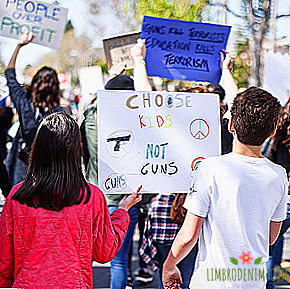Poster Editor Nina Nazarova about favorite books
IN BACKGROUND "BOOK SHELF" we ask journalists, writers, scholars, curators, and anyone else not about their literary preferences and publications, which occupy an important place in their bookcase. Today, Nina Nazarova, editor of the magazine, shares her favorite book stories.

I started reading very early, avidly and even, one might say, neurotic. My mother had a saying: "Do not read so much - you will ruin your eyesight." Sight really deteriorated pretty quickly, so my mother changed the wording to: "Do not read so much - you will go astray." However, jokes and jokes, but my parents never refused to buy books. At the same time, oddly enough, the most powerful literary impression of childhood turned out to be related to an unread book: once, when I was about ten years old, I went to my dad's room and saw Edward Limonov's novel "This is me - Edichka" on the bedside table. Opened to ask, immediately stumbled upon an angry and passionate obscene monologue (which is not surprising - the novel mainly consists of them) and completely dumbfounded from the discovery of what is basically printed in books - the effect was as if a wall had been blown away. I managed to read half a page, after which my father returned to the room, changed dramatically in the face, selected the book and hid it so that I could not find it.
I passed the transitional age like everyone else - with Brodsky, Dovlatov, Kharms and the poets of the Silver Age. I grew up in Tula in the 90s, there were no good bookstores in the city: one "Book World" with a scant choice where you had to ask sellers to show books from behind the counter, plus speculators laying on the asphalt on the GULAG Archipelago polyethylene with a fresh release of Playboy. I was saved by the fact that the elder brother of a school friend was in graduate school at the Tula Pedagogical University and gathered a brilliant home library. He did not condescend to talk with me, but he always allowed me to borrow books, for which I am infinitely grateful to him.

The opportunity to download Franzen’s novel on the day of his release in the USA is more valuable for me than all these fetishistic joys, like the rustle of pages

I remember how in 2000 my mother and I arrived in Moscow, and a friend took me to the “Young Guard” in Polyanka. I had an ecstasy: "Lord, the books! Many! They can all be taken from the shelves and flipped!" By the way, that’s why I now firmly prefer the Kindle to paper books: the opportunity to download Franzen’s new novel on the day of his release in America is much more valuable to me than all these fetishistic joys like the rustle of pages. The only thing that is inconvenient to read in the Kindle is notebooks. This is a rare genre, where the ability to walk back and forth through the pages is important.
I know English better than French, but I love French literature, especially the 19th century, more than English. Much of it came to my field of view in translation, or because of the reports of Vera Arkadyevna Milchina (taking this opportunity, I recommend her course on Arzamas). In general, I graduated from the Istfil of the RSUH - there my circle of reading was formed. There were costs: in university years, reading detectives and other light literature seemed to me not comme il faut, so even on vacation I tried to take something smarter. I remember once went to the beach with "Ulysses" of Joyce in the original, very tormented and with difficulty mastered the first chapter. On another trip to the resort, I took Jean-Jacques Rousseau’s “New Eloise” in French - as a result, I had to take the brochure about Montignac away from melancholy. Thank God, with age, this false shame rose.

"Galina"
Galina Vishnevskaya
One of the main books of my childhood is the memoirs of opera singer Galina Vishnevskaya. As it happens in childhood with books, this one fell into my hands completely by accident: strictly speaking, nobody particularly loved opera in the family, and at that time I did not hear a single piece in this genre, which did not prevent me from learning Vishnevskaya’s memories by heart . The book became the first adult historical document that I read: war, the blockade of Leningrad, Stalinist repressions, the intrigues of the Bolshoi Theater, the abomination of Soviet power, foreign tours with accompanying absurdity, Shostakovich, Sakharov, Solzhenitsyn - I made up my initial understanding of the history of Russia of the XX century precisely according to the memoirs of Vishnevskaya.

"Prose about love"
Benjamin Constant
Benjamin Constant - a writer and politician who lived in France and Switzerland in the late XVIII - early XIX century. His most famous work is Adolph, a 30-page love story. The plot is simple: the narrator falls in love with a married lady, she reciprocates his love, and without fear of condemnation of the world, throws her husband, and then the hero begins to wonder whether he really loves or not, if he is capable of strong feelings, and if so then why is it so boring for him - Constant reproduces his reflection masterly and surprisingly modern. Perhaps, because he knows what he is talking about: spiritual throwing was extremely peculiar to him as well - so much so that the politician even, not to repeat the same thing in his own diary many times, developed a system of conventional symbols.
It looked like this: "1 - physical pleasure; 2 - desire to cut off my eternal connection, which I so often talk about [with Ms. de Stael]; 3 - renewing this connection under the influence of memories or a fleeting outburst of feeling; 4 - work; 5 - disputes with the father; 6 - pity for the father; 7 - intention to leave; 8 - intention to marry; 9 - Ms. Lindsay was fed up; 10 - sweet memories of Ms. Lindsay and new flashes of love for her; 11 - I don't know what to do with Ms. Du Tertre; 12 - love for Madame Du Tertre. " My favorite tag is at number 13 - "everything is shaky, not sure about anything." For some reason, the idea that even a prominent statesman of France and an advocate of the constitutional order was unable to sort out his feelings and understand what he actually wants in life is very reassuring.

"Russia in 1839"
Astolphe de Custine
"Russia in 1839" enjoys the reputation of the biblical Russophobes. The French marquis travels around Russia in the summer of 1839 and describes meticulously and impartially everything he sees around — and he sees corruption, abuse, tyranny, rivalry with Europe and at the same time humiliation before it, serfdom, fear and ignorance. From quotations like: "Entering Russia, you must leave your free will along with your passport at the border," - there is a cold on the skin. The book under Nicholas I was instantly banned, which is not at all surprising - it is much more surprising that in Soviet times it was never completely translated. The reason is simple: too many things noticed by Custine did not change under the Soviet regime, neither - considering that we live in a country where librarians are arrested, and in the capital, where they move tiles every year, and roll them over the asphalt over the current one.

"Letters to his wife"
Alexander Pushkin
From "Letters to my wife" is the most quoted line, perhaps: "What a fool you are, my angel." Feminists at this place are startled, and for good reason: reading Pushkin's correspondence is pure happiness. Despite the fact that I wrote my dissertation on Russian literature of the 19th century and read letters, diaries and notebooks of various people, the testimonies of love life still produce a deafening effect on me - due to the fact that this is too much like, and quite not like what we are used to. There are not so many letters of Pushkin to Goncharova, about eighty pieces, and describe them in the scientific literature, as a rule, from the point of view of the formation of language - as they said about love in the XIX century. Pushkin appeals to his wife exclusively in Russian, emphasized simply and often even rudely, sometimes making fun of himself and others, now seriously, and almost always attentively; absolutely delightful reading.

"ZOO, or Letters Are Not About Love"
Viktor Shklovsky
Epistolary novel, how it could be in Russia in the beginning of the 1920s: Viktor Shklovsky, the founder of the formal method in literary criticism, writes Lili Brik's younger sister - Elsa Triolet, the future winner of the Goncourt Prize. He writes in a telegraphic style, where each sentence is a new paragraph: about emigration and life in Berlin, about the bestiary of the Russian avant-garde in the person of Khlebnikov, Remizov and Andrei Bely, that "it is good that Christ was not crucified in Russia: our climate is continental , frost with a snowstorm; crowds of disciples of Jesus would come at a crossroads to fires and would turn in line to renounce. " A hero cannot be formally written about love, because the feeling is non-reciprocal, but passion and despair are all the same across the line.
"ZOO" is a novel-meme, sooner or later Adme will get to him and make out quotes: "Whatever you say to a woman, get an answer now; otherwise she will take a hot bath, change the dress, and everything must start to speak first"; “I’m calling. The phone squeaks, I hear that I’ve stepped on someone”; "I wrapped my life around you."

"Records and extracts"
Mikhail Gasparov
Handbook of humanitarian intelligentsia. True sign: if philologists or historians marry, two copies of Records and Extracts will certainly be at home. Mikhail Leonovich Gasparov - historian of ancient and Russian literature, poetry, one of the main Russian philologists of the second half of the XX century. "Records and extracts" is not a scientific work, but essentially non-fiction, a book of a unique genre: there are in fact conversations and extracts from books, as well as memories, selected letters, experimental translations and several program articles, first of all "Philology as morality". All together forms the very whole, which is greater than the sum of its constituent parts.
I read the Records and Extracts for the first time at sixteen, and then during my studies at the RSUH I read a million more times - and it was interesting to note how people mentioned by Gasparov — first of all, scientists — acquired flesh and blood for me. Because of some bad luck, partly of the youthful carelessness of one of Gasparov’s lectures, I wasn’t able to hear, but the impression made by this book was so great that when he died, I went to the funeral: it was important to at least honor my respect.

"Anna Karenina"
Lev Tolstoy
This is either the second, or the third "Anna Karenina" in the history of the "Bookshelf" rubric, and I am sure that she will meet here more than once - sorry, can't do anything, classics, we all came out of Gogol's "Overcoat". Lev Tolstoy is by far the most important Russian writer for me, and the story of my relationship with his work is a typical example of a love-hate relationship. For the first time in Anna Karenina, I sat down between the 9th and 10th grades for the first time in the summer - my grandmother literally burned me that you don’t have time for a vacation to master the classics. The process went sadly and painfully - to follow the author's thought and the ups and downs of the plot lines was infinitely boring. Then there was the reading of the Kreutzer Sonata at the age of sixteen, when I, under the impression of the story, seriously considered whether to indulge in austerity, and revised my attitude to Tolstoy. I returned to Anna Karenina already in my fifth year, and I still clearly remember how I burst into tears in the subway on the scene of the Kitty clans. I associated myself, of course, with Levin.

"Smilla and her sense of snow"
Peter Hög
Scandinavian detective about snow, ramified conspiracy, self-denial, and the postcolonial dictatorship of Denmark. A fascinating story, quite a lot of interesting information about Greenland and the culture of its indigenous population, but the main thing is the character of the main character: exceptional sobriety and impenetrable self-confidence of a person in a foreign country who firmly knows that he will never become his own - and thereby acquires an inner freedom. Well, and a bonus: reading "Smilla" is the only case in my whole life, when, when describing an erotic scene, I jumped and thought: "Wow, this is technically possible ?!"

"Vienna. Guide" Posters ""
Catherine Degot
At first glance, the guidebook is a publication too applied to appear in the list of favorite books. But go and see: it was thanks to him that I was able to discover old art for myself. Up to twenty-five years I didn’t develop at all with him - everything merged into a dull series of crucifixes and annunciation. Tar - perhaps the main Russian art critic, and thanks to the excellent mastery of the context, she treats Vienna museums and temples biasedly and emotionally: once enthusiastically, once caustically, and sometimes quite mockingly. I suddenly discovered that, firstly, all the Annunciation are very different, secondly, that considering what they are different is a wildly fascinating activity, and thirdly, it is not necessary to go to museums with an expression of reverent awe on your face, and and in medieval authors it is easy to find something exciting, touching or, say, ridiculous.

"By themselves"
Svetlana Reuter
Strictly speaking, this book is a scam: almost all articles published in the collection were read separately when they were published, and nevertheless it is very important for me to mention Svetlana Reiter here in principle: thanks to her long-time material "Biochemistry and Life" I once realized that journalistic texts produce no less powerful effect on me than literary works. The Reuters texts are examples of social journalism, due to the nature of Russian reality for the most part hopeless and ruthless to the reader. The report "Biochemistry and Life" that hit me once, was not included in the collection. He was dedicated to genetic screening, which makes pregnant women, and began with the fact that the journalist receives the test results and learns that the probability of having a child with Down syndrome is extremely high. Besides the fact that it is in principle a very useful material, he remembered me for one more reason: the ability to take a step aside and transform my own fear into the story that I want to share, seems to me an extremely valuable human gift.






